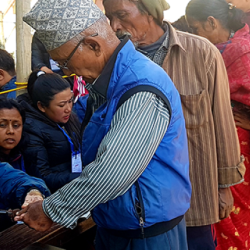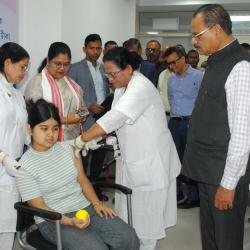Japan's obstructionist position on illicit trade protocol
Negotiations toward a protocol on illicit tobacco trade to the global tobacco treaty, formally known as the World Health Organization Framework Convention on Tobacco Control (WHO FCTC), were held earlier this month.
The illicit tobacco trade makes up approximately 10 percent of global tobacco sales and costs governments between 40-50 billion dollars (27-34 billion euros) every year.
"Transnational companies benefit in a number of ways from the illicit trade in tobacco," said Kathyrn Mulvey, Director of International Policy, Corporate Accountability International (CAI).
While many countries voiced their commitment to a protocol that will require tobacco corporations to assume responsibility for their supply chains, provide financial disincentives to the illicit tobacco trade, and prevent government collaboration with the tobacco industry, Japan earned the first Marlboro Man Award of the protocol negotiations.
The Marlboro Man Award, bestowed by the Network for Accountability of Tobacco Transnationals (NATT), exposes and challenges countries for espousing treaty positions that benefit the tobacco industry at the expense of public health.
The award is named after Philip Morris's notorious advertising icon, which has played a central role in spreading tobacco addiction globally. On the strength of the Marlboro Man advertising and promotional campaign, Marlboro became the world's leading cigarette brand, and Philip Morris/Altria (soon to split into Philip Morris USA and Philip Morris International) became the world's largest and most profitable tobacco transnational.
In its opening comments during the above illicit tobacco trade negotiations, Japan questioned the value of a potential protocol and suggested that the illicit tobacco trade could be tackled at the domestic level and through existing trade and intellectual property agreements. The Japanese government owns a 50% stake in Japan Tobacco, the world's third largest tobacco corporation, and was sharply criticized throughout the FCTC talks for advocating positions that served the interests of Big Tobacco.
"Tobacco industry interference poses a huge threat to implementation of the global tobacco treaty," said Mulvey.
"Governments and civil society must be vigilant to ensure that this vital protocol is not derailed."
"Considering that Japan Tobacco's products are being smuggled into West African markets like Nigeria, we're concerned that the Japanese government has a conflict of interest in these negotiations," says Akinbode Oluwafemi of Environmental Rights Action Nigeria, also a NATT member.
"Reversing this entirely preventable epidemic [tobacco epidemic] must now rank as a top priority for public health and for political leaders in every country of the world" had said Dr Margaret Chan, Director-General of the WHO to mark the release of the Global Tobacco Epidemic Report (2008) of World Health Organization released earlier this month.
But without holding tobacco corporations accountable and monitoring them stringently to ensure that effective tobacco control policies work with the utmost impact, reversing the global tobacco epidemic shall remain a daunting challenge.
Tobacco corporations across the world have been not only aggressively protecting and promoting their tobacco markets, particularly in the developing countries, but also trying their best to either abort or weaken the public health policies that begin to take shape in countries around the world.
Alert monitoring of tobacco corporations and holding them accountable for violating existing health policies in present and the past will help reduce the tobacco use globally.
Other Contents by Author
The smoke-free policies in India were enforced since 2 October 2008 and different states are at varying levels of its implementation, yet the tobacco cessation services are still limited to very few clinics in India.A lead article published in The Economist (7-13 March 2009) says: "tobacco is more addictive than virtually all of them [narcotic drugs]."With tobacco being highly addictive, it is clear that for a successful implementation of the smoke-free policies, the scaling up of high-quality and reliable tobacco cessation services can no longer be ignored."Large areas in central and north-east India have more than 65 per cent tobacco use" said Dr Pratima Murthy, who is the...
On 23 January 2009, the Group of Ministers (GoM) in India will again meet to assuage concerns of tobacco lobby on pictorial warnings, health activists apprehend.This group of ministers (GoM) consists of: Pranab Mukherjee (External Affairs Minister), Kamal Nath (Commerce and Industry Minister), Priyaranjan Dasmunsi (former Information and Broadcasting Minister), S Jaipal Reddy (Urban Development Minister), Dr Anbumani Ramadoss (Health and family welfare Minister), and Oscar Fernandes (labour and employment Minister for state). The pictorial warnings on tobacco products are proven to reduce tobacco consumption. Particularly in countries like India, where literacy rates are alarmingly low, it...
To confront the present war posturing between India and Pakistan, the citizens of both countries are launching a joint signature petition campaign on 9 January 2009, to voice their mandate against terrorism, war posturing and to promote mutual cooperation and peace. This signature petition campaign shall conclude on 8 February 2009, after which these signatures shall be handed over to the heads of both the nations along with other prominent stakeholders. Citizens of both nations can also sign online here or by going to the following URL: http://www.PetitionOnline.com/ indopak/petition.html The petition states that the citizens of Pakistan and India demand that: The Government of Pakistan...
The first patient was successfully treated by the state-of-the-art technology in radiotherapy – linear accelerator, which began functioning last week at RR Cancer Institute and Research Centre, Sri Ram Murti Smarak Institute of Medical Sciences (SRMSIMS), Bareilly in India.A linear accelerator (LINAC) is the device most commonly used for external beam radiation treatments for patients with cancer. The linear accelerator can also be used in stereotactic radiosurgery similar to that achieved using the gamma knife on targets within the brain. The linear accelerator can also be used to treat areas outside of the brain. It delivers a uniform dose of high-energy x-ray to the region of the...
India is reeking under increasing communal polarisation and urgent steps to check it are warranted. Between 24 August and 2 October 2008, more than 300 villages in 14 districts of Orissa state were affected by communal violence. 4,300 houses were burnt and 57 people were killed. 2 women were gang-raped. 149 churches and 13 educational institutions were attacked. In Kartnataka state, 19 churches in 4 districts were attacked and 20 women sustained serious injuries. In other states of India, like in Kerala 3 churches were attacked, in Madhya Pradesh 4 churches were attacked, and one church was attacked in Delhi and Tamil Nadu each. In the state of Uttarakhand, 2 people were killed. In all the...
India has boldly enforced the smoke-free policies banning smoking in public places and private areas with public access from 2 October 2008 – the birth anniversary of the father of nation Mahatma Gandhi.The government of India and countless people who have been advocating the enforcement of public health policies need due credit. It was certainly not so easy, more so because of the financially robust, strategically shrewd tobacco industry that has mastered the art of circumventing public interest policies and promoting a product (tobacco) that kills even when used as intended by the manufacturer.The tobacco industry, and other corporations or associations like ITC ltd, Indian Hotel...
The 3rd edition of the "Global Tobacco Treaty Action Guide 2008: Protecting Against Tobacco Industry Interference" was released earlier this week in many countries including India, during International Week of Resistance (IWR) to tobacco transnationals (22-28 September 2008). The Global Tobacco Treaty Action Guide 2008 is produced by Corporate Accountability International [which is in official relations with the World Health Organization (WHO)], along with the Network for Accountability of Tobacco Transnationals (NATT).The need for IWR was never so acute – when on one hand government of India is resolved to enforce the nation-wide ban on smoking from 2 October 2008, the...
It is a pity that India's robust smoke-free policies have been challenged by those with vested interests neglecting the immense and undisputed proven public health benefits of implementing such policies for people at-large. India is to ban smoking in public places nation-wide from October 2. However the ITC Limited and the Indian Hotel Association are among those who have challenged these public health policies in the court of law. The hearing by the honourable court is due."Secondhand smoke, also know as environmental tobacco smoke (ETS), is a mixture of the smoke given off by the burning end of a cigarette, pipe or cigar and the smoke exhaled from the lungs of smokers. It is...
There is a growing consensus to raise awareness about diabetes in the 50 days leading up to World Diabetes Day on 14 November 2008. The International Diabetes Federation announced that the theme for this year's campaign is "Diabetes in Children and Adolescents."Diabetes is one of the most common chronic diseases to affect children. It can strike children of any age, even toddlers and babies. Every day more than 200 children are diagnosed with type 1 diabetes, requiring them to take multiple daily insulin shots and monitor the glucose levels in their blood. It is increasing at a rate of 3% each year among children and rising even faster in pre-school children at a rate of 5% per year...
All tobacco products will display approved pictorial warnings and nicotine-tar levels from 30 November 2008, as per a notification issued by the Indian Ministry of Health and Family Welfare (dated 27 August 2008), in accordance with the Cigarettes and Other Tobacco Products (Prohibition of advertisement and Regulation of Trade and Commerce, Production, Supply and Distribution) Act, 2003. The implementation of pictorial warnings on tobacco products in India was initially planned for February 2007, but got deferred four times thereon.Grim images of diseased lungs will appear on cigarette, bidi and gutkha packets, as per the notification, covering 40 per cent of the surface area of the tobacco...










Add new comment